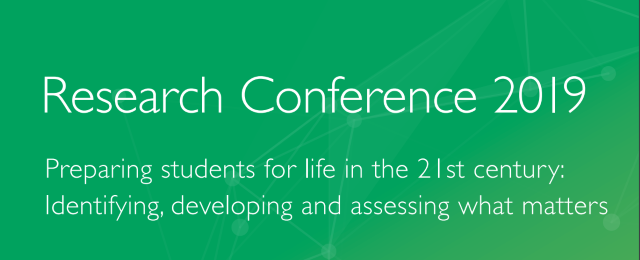
Monday 5 August 2019
Start Date
5-8-2019 1:15 PM
End Date
5-8-2019 2:15 PM
Subjects
Generic skills, Cooperation, Futures (Of society), Problem solving, Critical thinking, Creativity, Curriculum frameworks, Inquiry, Measurement, Educational policy, Primary secondary education
Abstract
It is vital that education systems deliver quality outcomes for all young people and prepare them well for their future in the economy and society. To do so, many systems have traditionally had a strong focus on developing academic skills, particularly in literacy and numeracy. In recent years, education systems have developed greater expectations that schools will also equip young people with a broader set of skills for the 21st century (e.g. creativity, critical thinking, problem-solving). This paper addresses these developments and the challenges they present. Building on an evidence-based review, this paper asks what are the key skills required for the 21st century? How do various jurisdictions articulate their aspirations concerning these broader skills within their curricular and policy frameworks? What evidence is there about the best way to incorporate key skills for the 21st century into curriculum and teaching and learning? How can a more diverse set of skills be measured and assessed?
Recommended Citation
Doecke, E., & Maire, Q. (2019, August 05). Key skills for the 21st century: An evidence-based review [Paper presentation]. Research Conference 2019 - Preparing students for life in the 21st century: Identifying, developing and assessing what matters. https://research.acer.edu.au/research_conference/RC2019/5august/8
Key skills for the 21st century presentation
Copyright Statement
Copyright Australian Council for Educational Research 2019
Place of Publication
Melbourne, Australia
Publisher
Australian Council for Educational Research (ACER)
ISBN
9781742865546
Included in
Curriculum and Instruction Commons, Educational Assessment, Evaluation, and Research Commons
Key skills for the 21st century: An evidence-based review
It is vital that education systems deliver quality outcomes for all young people and prepare them well for their future in the economy and society. To do so, many systems have traditionally had a strong focus on developing academic skills, particularly in literacy and numeracy. In recent years, education systems have developed greater expectations that schools will also equip young people with a broader set of skills for the 21st century (e.g. creativity, critical thinking, problem-solving). This paper addresses these developments and the challenges they present. Building on an evidence-based review, this paper asks what are the key skills required for the 21st century? How do various jurisdictions articulate their aspirations concerning these broader skills within their curricular and policy frameworks? What evidence is there about the best way to incorporate key skills for the 21st century into curriculum and teaching and learning? How can a more diverse set of skills be measured and assessed?

